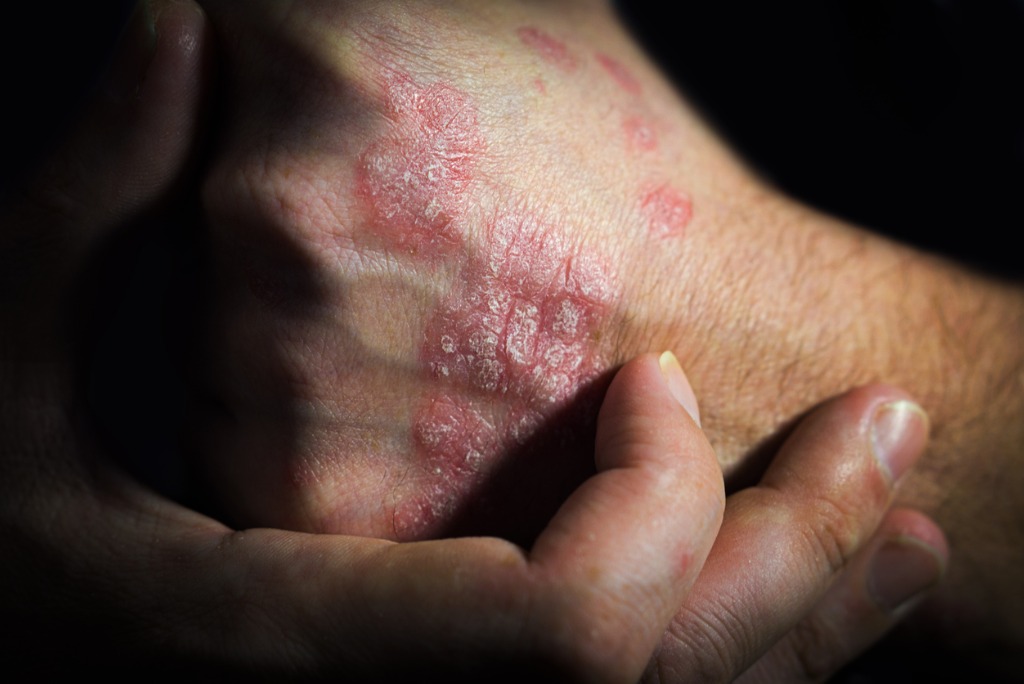Psoriasis is a chronic, autoimmune skin condition. By speeding up the growth cycle of skin cells, psoriasis creates thick, red patches on the skin that are frequently covered in white scale-like tissue. Various types of psoriasis affect nearly 7.5 million US adults.
The type of psoriasis you experience can influence the symptoms and complications associated with your condition as well as the treatment plan that is right for you. If you are suffering from psoriasis and are unsure what type you have, your dermatologist can help. In the meantime, here is a guide to six common types of psoriasis and the symptoms associated with them.
6 of the Most Common Types of Psoriasis
Although plaque psoriasis is the most common, there are several other types of psoriasis that are just as noticeable and uncomfortable. In order to properly diagnose and treat your psoriasis, you should be aware of the different types you may encounter.
1. Plaque Psoriasis
As mentioned above, plaque psoriasis is the most common form of psoriasis people experience. Plaque psoriasis causes itchy, dry skin and may cause the skin to be covered in thick scales. These scales are often seen on the knees, scalp, lower back, and elbows but may be found on any part of the body.
To help relieve the itching and inflammation associated with plaque psoriasis, your doctor may prescribe a topical ointment or steroid. Home remedies such as an oatmeal bath or using aloe vera may also help reduce the itching and discomfort.
2. Nail Psoriasis
Nail psoriasis is a type of psoriasis that affects the nails and tends to cause discoloration and ridged or pitted nails. In some cases, your nails may begin to crumble or separate from the nail bed. Those with nail psoriasis are also at a higher risk of fungal nail infections. Potential treatment options include phototherapy, corticosteroids, and oral medications. In some cases, laser treatments may be used to target and destroy the cells causing nail psoriasis.
3. Guttate Psoriasis
This type of psoriasis is triggered by streptococcal infections and is most common in children. Those with guttate psoriasis may experience small drop-like lesions on their skin that are often found on the arms, legs, and torso. These lesions aren’t as thick as those created by plaque psoriasis but may be itchy or painful. Guttate psoriasis usually responds well to topical treatments and phototherapy.
4. Inverse Psoriasis
Inverse psoriasis is also known as intertriginous psoriasis and is usually found in the skin folds such as the armpits and groin area. As new skin cells form faster than they can be shed, a shiny rash may develop in these areas. Those who are overweight or have deep skin folds may be more likely to experience inverse psoriasis. Injuries to the skin, friction, and sweat may worsen your symptoms. If family members have a history of psoriasis, you may be at a higher risk of developing inverse psoriasis. Inverse psoriasis is often treated with topical creams and ointments, phototherapy, and injectable medications.
5. Pustular Psoriasis
Pustular psoriasis causes pus-filled bumps called pustules to form on the skin. Within days after these pustules form, they may begin to burst open. As the pus is released, the skin will become red and tender. Generalized pustular psoriasis (GPP) is more severe and may cause a fever, chills, fatigue, and dehydration. If you are experiencing generalized pustular psoriasis, contact your doctor immediately, as it may be severe and can lead to serious health complications. To treat pustular psoriasis, your doctor may prescribe medication or topical treatments. In more severe cases, hospitalization may be required.
6. Erythrodermic Psoriasis
Erythrodermic psoriasis is more severe than other types of psoriasis and covers a large portion of the body. This type of psoriasis resembles a burn and may cause chills and a fever. Similar to a bad sunburn, your skin may start to peel and itch severely. In addition, the rash may impact your ability to produce sweat and maintain body temperature. Erythrodermic psoriasis requires immediate medical attention as it increases your risk for serious health complications such as heart failure and pneumonia. Treatments for erythrodermic psoriasis include:
- Hypoallergenic moisturizers
- Corticosteroids
- Immunosuppressants
- Disease-modifying antirheumatic drugs (DMARDs)
Find a Clinical Trial for Your Psoriasis With Olympian Clinical Research
At Olympian Clinical Research, we offer clinical trials for those seeking new treatments and medications to help manage their psoriasis symptoms. While the different types of psoriasis may present unique challenges, our team of medical professionals and experts is dedicated to advancing medicine through clinical trials. Contact us today to learn more about our current clinical trials.

Recent Comments